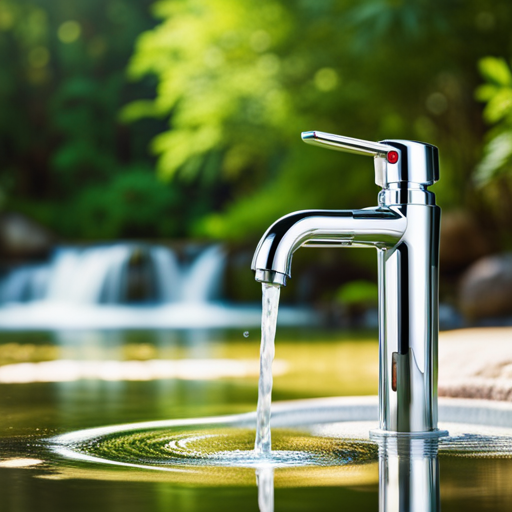Are you concerned about the harmful chemicals lurking in your drinking water? Reverse osmosis (RO) may be the solution you’ve been searching for.
RO is a water treatment technology that has gained popularity in recent years for its ability to remove volatile organic compounds (VOCs), a common type of harmful chemical found in many household products.
But how effective is RO in removing these chemicals, and is it the right choice for your home?
This article will explore the effectiveness of RO in removing VOCs from drinking water, as well as the various factors that can affect its performance. We’ll also discuss the importance of certification and testing when it comes to choosing the right RO system for your home.
By the end of this article, you’ll have a better understanding of whether or not RO is the solution for harmful chemicals in your water and what other treatment options may be available to you. So, let’s dive into the world of RO and take the first step towards cleaner, safer drinking water.
Key Takeaways
– RO can effectively remove VOCs from drinking water, but the type of membrane used and the concentration of pollutants are important factors.
– Activated carbon filters can enhance the ability of RO to remove VOCs.
– NSF/ANSI Standard 58 certification ensures that an RO system meets certain standards for contaminant reduction, including VOCs.
– Laboratory testing is the most reliable way to determine whether or not water is contaminated with VOCs.
Effectiveness and Limitations
You may be wondering about the effectiveness and limitations of reverse osmosis (RO) for removing harmful chemicals from your drinking water. While RO is effective for removing some volatile organic compounds (VOCs) and large organic molecules, it may not be as effective for others, such as vinyl chloride.
The effectiveness of RO also varies depending on the type of membrane used and the concentration of pollutants. It’s important to note that many household products contain VOCs that can leach into groundwater, ultimately ending up in your drinking water. This means that even if you have an RO system, it may not be able to remove all harmful chemicals.
It’s recommended to use activated carbon filters in conjunction with RO to improve its ability to remove VOCs. Additionally, testing your water for VOCs through laboratory testing is the most reliable way to determine whether or not your water is contaminated.
Certification and Testing
When choosing a system to remove VOCs from your drinking water, it’s important to look for NSF/ANSI Standard 58 certification and consider laboratory testing for the most reliable results. This certification ensures that the RO system meets certain standards for contaminant reduction, including VOCs. Additionally, laboratory testing can provide a more accurate measurement of VOC levels in your water compared to home testing kits.
It’s important to consider the potential VOC exposure risks when selecting an RO system. Even if your water contains VOCs below the EPA’s maximum contaminant level, there is still some risk to human health. VOCs have been linked to various health issues, including respiratory problems, headaches, and even cancer. By choosing an RO system with proper certification and testing, you can have peace of mind knowing that you are removing harmful chemicals from your drinking water.
| VOCs | Removal Effectiveness | Membrane Type |
|---|---|---|
| Benzene | Low to Moderate | Thin Film Composite |
| Toluene | Low to Moderate | Thin Film Composite |
| Dichloromethane | High | Cellulose Acetate |
| Vinyl Chloride | Low | Thin Film Composite |
| Formaldehyde | High | Thin Film Composite |
Other Treatment Options
Consider alternative methods for removing VOCs from your drinking water, such as activated carbon filters, air stripping, and oxidation. Activated carbon filters are effective for removing a variety of VOCs, including solvents like benzene and toluene. These filters work by adsorbing the VOCs onto the surface of the carbon, trapping them and preventing them from passing through the filter. This method is particularly useful for treating water with low to moderate concentrations of VOCs.
Air stripping is another method for removing VOCs from water. This process involves exposing the contaminated water to air, allowing the VOCs to evaporate into the air and be removed from the water. This method is effective for removing VOCs with low boiling points, such as trichloroethylene and perchloroethylene. However, it may not be as effective for removing VOCs with higher boiling points, such as vinyl chloride.
Overall, it’s important to consider all available treatment options and choose the one that best suits your specific needs and the types of VOCs present in your drinking water.
Conclusion
So, is reverse osmosis the solution for harmful chemicals in water? The answer is: it depends.
While RO is effective in removing many types of contaminants, including VOCs, its effectiveness can be affected by various factors such as the quality of the membrane and the water pressure. Additionally, RO systems can be costly to install and maintain, making them an option that may not be suitable for everyone.
It’s important to do your research and consider all the factors before deciding on the best water treatment option for your home. While RO may be the right choice for some, there are other treatment options available that may be more suitable for others.
Ultimately, the goal is to ensure that the water you and your family are drinking is safe and free of harmful chemicals.




